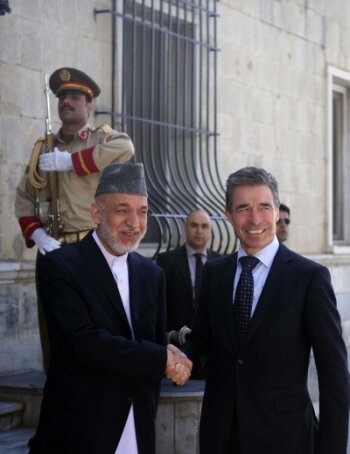HISTORIC MOMENT IN AFGHANISTAN
27 June, 2013
 The North Atlantic Alliance handed over the control over the security throughout Afghanistan to the local army and police, the move broadly seen as a strong factor against further terror attacks on ISAF, including Georgian troops.
The North Atlantic Alliance handed over the control over the security throughout Afghanistan to the local army and police, the move broadly seen as a strong factor against further terror attacks on ISAF, including Georgian troops.The historic moment for Afghanistan arrived on 18 June when the NATO leadership ceded the control to Afghanistan President Hamid Karzai.
For ten years the ISAF forces have been training the Afghan army, police and special services for this remarkable day. Now these local forces are seen capable of ensuring order in the country. This turnaround decision bears special significance for the Georgian troops, who serve under ISAF mission there. For one thing, they would be less likely to patrol Afghan roads and escort military convoys and hence, serve as the targets for Taliban.
The Afghan army, as well as the police and special services may still harbor a number of furtive supporters of Taliban. Any time they can turn into executioners of Taliban terror attacks against the law enforcers.
In addition, the number of deserters remains high, which is a big headache for the Afghan Army; increasing cases of defection have been defying the solution of the problem till now. At any rate, the major shift in the responsibility for the security seems to be a logical step after almost twelve years of Western coalition’s entry into Afghanistan, especially when ISAF is gradually reducing the size of its contingent. The last ISAF soldier should leave the country by the end of 2014, heralding the end to the mission.





















































